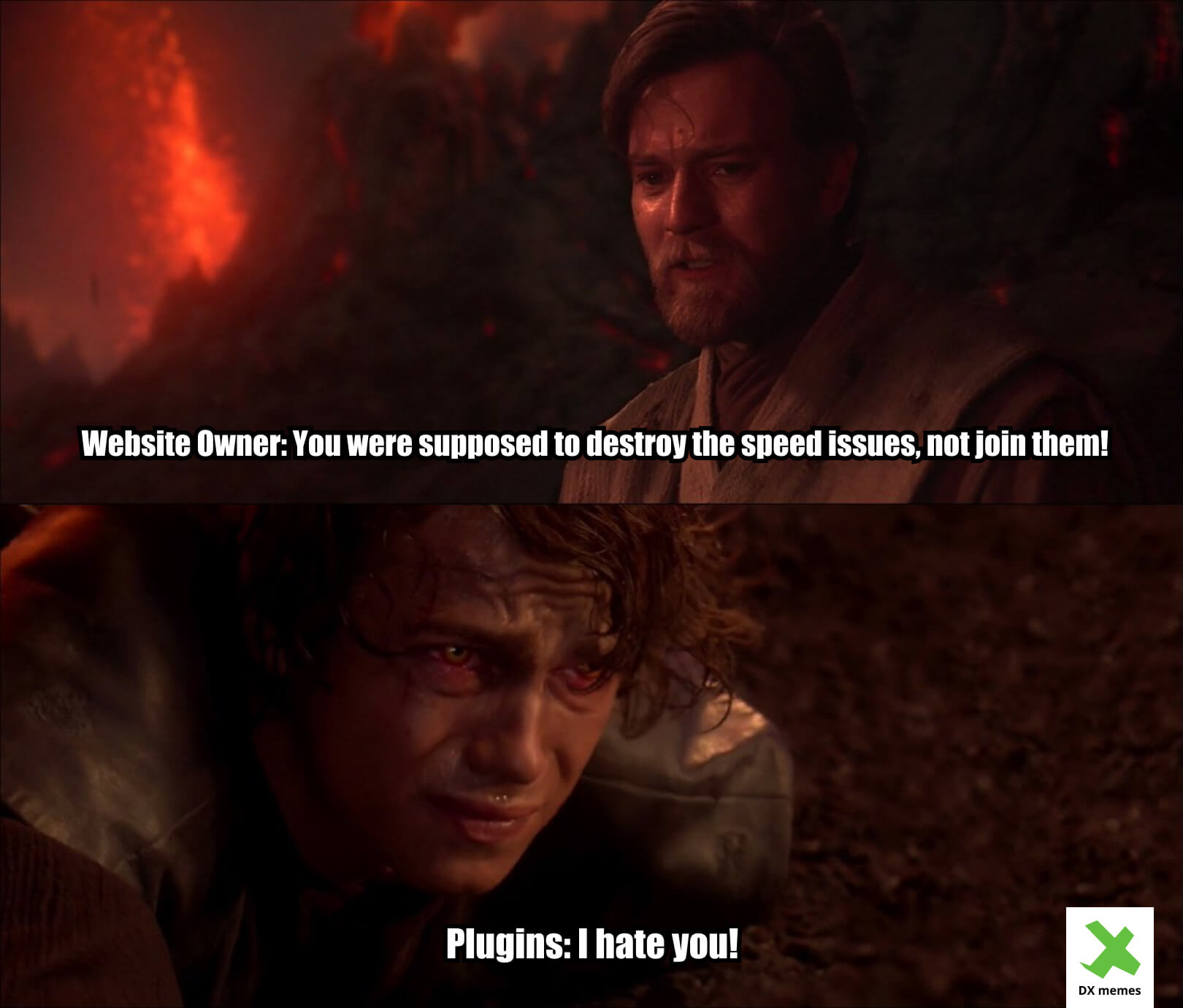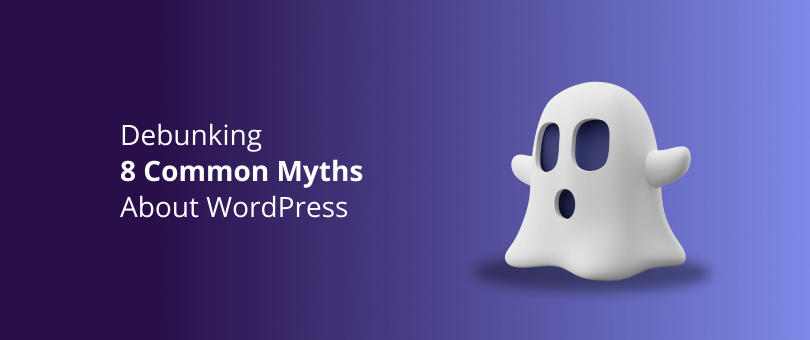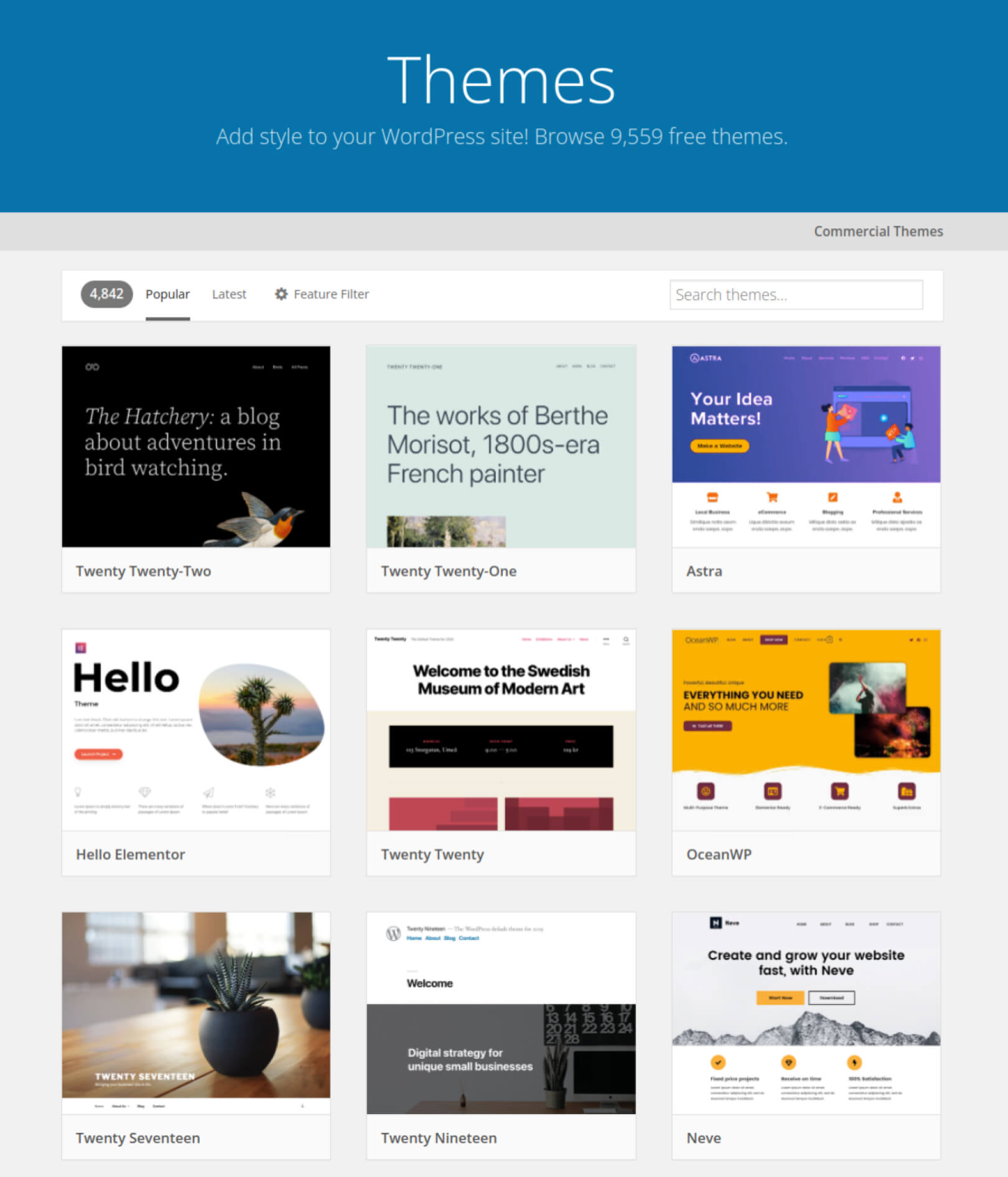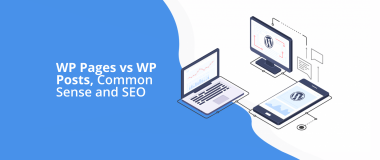WordPress has taken over the web and for a good reason – it’s the best CMS there is, and you can build, practically, any type of website with it. That’s why more than 43.3% of all websites around the world are powered by the platform.
However, we all know that the more popular someone is, the more gossip surrounds them. The same goes for our favorite CMS.
There’s a myriad of WordPress myths that circulate around the web community and spread confusion as to whether WordPress is good or bad. Some of these are rooted in past practices that are no longer used, others are exaggerated half-truths, mishaps blown out of proportion, or are simply not true.
And even though we are crazy about the platform, we know that, the same as with every technology, our beloved WordPress has its limitations.
But are these as bad as people paint them to be?
In this article, we will debunk 8 common myths about WordPress, so stick around and read on!
1. WordPress Is Only for Bloggers and DIY Websites

That’s the oldest myth about WordPress and it has its origins in the dawn of the platform, when it was, indeed, designed for blogging.
In fact, WordPress is still an awesome choice for bloggers and people on a budget who want to build a website without development and coding background.
However, over the years, WordPress has grown into so much more than just a blogging platform. It still preserves its simplicity but it also allows for advanced development and building of complex web solutions.
This means that while your average Joe can watch or read a tutorial and learn how to build a simple WordPress website overnight without touching a single line of code, a skilled programmer can create almost anything imaginable.
Today’s WordPress is highly customizable and allows skilled programmers to create unique solutions. It is equally qualified as a platform for a simple blog, a one-page solution, a business card website, an eCommerce store, a large publication with thousands of pages, a small business website, or a complex enterprise solution.
2. WordPress Is No Fit for Enterprise-Level Websites

This one makes our heads ache!
So many enterprise sites have been successfully built and are currently managed using WP that we can assure you that WordPress works amazingly well for larger companies.
In fact, it’s better than any other open-source, proprietary, or custom CMS solution on the market.
The reason for this is that WordPress can successfully deliver on the high technical requirements of enterprise websites, and, at the same time, its scalability allows websites to grow with their companies.
Also, with WordPress, larger companies can count on all the great benefits and features of open-source software. This means that they have full ownership of their web property and can switch providers anytime they need. At the same time, the CMS is completely customizable and with the right WordPress agency, you can build the website of your dreams, exactly the way you want it.
High-end development companies do not only build and maintain websites, they can create unique plugins, themes, and solutions that perfectly match business needs, goals, and requirements.
Although the platform allows for building complex web solutions, it is still easy to manage and operate. This means that you can quickly onboard new additions to your team, as opposed to custom solutions where they need to learn everything from scratch.
Furthermore, its multisite capabilities make it a great option for international branding. You can maintain consistency across markets while still being flexible enough to facilitate adjustments to each local website. This way, your solution can match the specifics of each audience and stay on brand.
If you still have doubts that WordPress is more than capable of handling enterprise-level websites, here are some of the largest companies in the world whose presence is powered by WordPress:
Hint: These include Walt Disney’s corporate website, Sony, TechCrunch, Mercedes Benz, and more!
3. WordPress Is Not Secure
To be honest, nothing on the web is really secure.
That said, WordPress is actually very safe if you put in the time and effort to properly maintain your website.
However, this WordPress myth is not entirely baseless. If you are not backing up your websites and don’t install updates, you are more prone to hack attacks and malware.
As WordPress is open-source, anyone can view the code and exploit its weaknesses. And yet, the same applies to countermeasures – anyone can look for bugs and issues and report them.
Right now, you’re probably wondering – who wastes time on bugs that are not their problem?
As a matter of fact, the WordPress community does this all the time. There are thousands of developers all over the world, who are just as in love with WordPress as we are. We all care about the platform and contribute in any way we can to make it better and more secure.
As a result, there are constantly new updates and patches dedicated to eliminating issues and ensuring its security. However, if you are not installing them in a timely manner, you may, indeed, get in trouble.
And then there are the plugins.
Plugins, as well as themes, pose another security threat for WordPress. There are tens of thousands of them and they allow you to make your website look any way you want to, and add all the features you fancy.
Unfortunately, not all plugins and themes are made equal. Some are of poor quality and have messy code, or the provider has ceased to maintain and update them. As a result, they can be a Trojan horse for malware, and expose your data.
To avoid this, you should always mind the reputation of the plugins and themes you use, and make sure to regularly update them.
4. WordPress Is Free, So It Must Be Low-Quality
WordPress is, indeed, free to use and open-source. However, the quality of a WordPress website depends on who’s creating it, how skilled they are, and what plugins and themes they are using.
As mentioned, the WordPress core is constantly being updated and improved by WordPress and its community. This makes it far better than any other CMS on the market because thousands of people are constantly looking out for it. There isn’t another product on the market that enjoys such dedication and support. As a result, WordPress is not just great – it’s getting better with every new core update.
However, the reason behind this myth is, most likely, the idea of something being free means its quality must be questionable.
The popularity of the platform has also led to an en mass rush towards it. Loads of developers and agencies have created themes and plugins without anyone overseeing the quality. This means that an inexperienced user may not be able to tell the difference between a quality solution and a poorly coded one, so they are at risk of choosing themes and plugins that don’t deliver on promises and expectations.
To avoid this, users should always research the free solution they choose, or even better, opt for paid or custom plugins and themes. Read the reviews, consider your options, and make sure that whatever you pick, it’s still being regularly improved and updated.
And, if your business’s success depends on your website, make sure you hire professionals, rather than running the risk with a DIY experiment.
5. WordPress Is Not Scalable

Oh, but it is!
The fact that WordPress is simple to use and works just fine for small businesses doesn’t mean that it is not capable of facilitating growth.
Being customizable means that you can add and implement any functionality and feature to your website, develop it, and change it to cater to the needs of your business.
In addition, WordPress has been accused of not being able to handle large amounts of traffic, and, as a result, people expect that their website will crash when traffic surges or if their visitor numbers grow exponentially.
Whether this will happen or not is not up to WordPress, but depends on the type of hosting you use.
More often than not, DIY websites and small businesses opt for shared hosting because it’s more affordable. And this is, indeed, a great choice if you are not expecting many people to visit your site
However, when your traffic grows, so do your hosting needs. Website owners that are taking their business seriously should consider investing in managed hosting and upgrading their plans to match their current business needs.
Furthermore, speed optimization can improve website performance and ensure that traffic runs smoothly.
6. WordPress Doesn’t Offer Support
It’s a common misconception that, because WordPress is free, there isn’t a support team available to the users. This means that if you are in trouble there’s no one to turn to.
This, of course, would be a serious deal-breaker for people without a programming background who want to build and maintain a website themselves on a budget. Websites tend to break from time to time, and with no experience whatsoever, this can be really intimidating.
However, WordPress does have support. In fact, there are not only the comprehensive guides and tutorials provided on the official website. There are multiple online communities creating how-to guides, videos, FAQs, and Q&As.
Furthermore, there are the WordPress official support forums where you can ask all kinds of questions and browse the information that other members have discussed.
The WordPress community is cordial and welcoming and, since there are people from all around the world in it, there’s always someone around to help.
On top of that, there are multiple professional WordPress agencies that you can hire to maintain and support your website. They can consult with you on digital presence, and provide insights on how to improve your property and grow your business.
7. WordPress Websites All Look the Same
There are a lot of WordPress websites that do, in fact, look the same, there’s no point in denying this.
The reason for this common WordPress myth is that many inexperienced users look no further than the default themes. Even though these are customizable, the overall design and layouts of the website remain the same. As a result, you have hundreds of websites that look quite the same.
However, they really don’t need to.
There are thousands of free and paid themes available that allow you to make your website look exactly the way you want it to. They have different layouts, buttons, popups, colors, fonts, and whatever else you can think of.
Furthermore, they, too, are customizable and allow you to adjust them to best fit your goals, needs, and vision.
On top of that, there are drag-and-drop page builders that allow you to create your own design for your website without having to learn to code.
And if you are a large business that can afford it, you can hire an agency to design a completely unique and professional custom theme for you.
In a nutshell, WordPress websites can and should be unique, you just have to think beyond the box when building them.
8. WordPress Websites Are Slow
WordPress websites can, indeed, be slow if they are not properly optimized, but then again, every website will be under the same circumstances.
The speed and performance of your website depend on many factors, including, but not limited to:
- Code quality
- Cashing
- Minifying JavaScript, CSS, and HTML
- Implementing CDN
- Images, videos, and other media
- Hosting type
- Plugins
Most of these can be improved and managed through plugins, but you should be careful and avoid using too many, because they can add to the problem, instead of fixing it.

However, the point is that the speed of a WordPress website depends on how it is built and whether it is optimized.
For smaller websites, the user can, more often than not, manage the issue themselves with the help of tutorials and plugins.
Large businesses have higher technical requirements and should always consider investing in high-quality WordPress maintenance. Their agency can deal with the speed issues in no time and offer advice on how to avoid them in the future.
All in all, speed is not an issue with WordPress anymore than it is with any other platform. It’s a matter of code quality, maintenance, and following good practices.
Bottom Line
At the end of the day, haters gonna hate but WordPress is the best website platform out there.
All the myths that circulate the web are just that – myths and misconceptions. Although there is often a grain of truth in some of them, the bigger picture usually tells a different story.
WordPress is flexible, scalable, and customizable. On top of that, it’s easy to use and manage, and this makes it a great choice for, practically, any business from a single operation hobby blogger to the most influential government in the world (yeah, the White House’s website is also powered by WordPress).
That’s why it’s the most popular CMS on the web, and that’s why we love it!





